 Students were entranced by the stories shared by a Sicilian volunteer who had once been a close friend of anti-Mafia legend, Peppino Impastato
Students were entranced by the stories shared by a Sicilian volunteer who had once been a close friend of anti-Mafia legend, Peppino ImpastatoOn Monday afternoon, the HSIT 380: Cosa Nostra: Cinema and History of the (Anti) Mafia class met with local Libera volunteers to learn about their personal encounters with the Mafia and work against the Mafia. Libera is an anti-Mafia organization that was established in 1995 with the purpose of involving and supporting those who were interested in the fight against mafias and organized crime.
During the in-class presentation, students were entranced by the stories shared by a Sicilian volunteer who had once been a close friend of anti-Mafia legend, Peppino Impastato. Volunteers contrasted the idea of the Mafia as a “delinquent group” with their view of organized crime as a “power system”; using as an example the Mafia’s switch from typical criminal activity to its modern entrepreneurial system through which it now maintains its power.

Another volunteer, a journalist from Umbria and active member of Libera, shared that the organization works primarily as an educational association that seeks to inform people about the history of the Mafia in order to keep history from repeating itself. Libera recognizes that Mafia-related topics are often sensitive and difficult to approach. For this reason, they educate the community with a specific focus on teaching professors and teachers of all grade levels about how to present the Mafia in a way that can be properly understood by young people. The association believes that knowledge is power and by informing the populace of the reality of who and how the Mafia are, they are able to combat and diminish the influence of organized crime.
At the end of the presentation, students were invited to ask questions and to take note of a local March in memory of Mafia victims. The Umbra community was then invited to attend the march that will take place throughout Perugia’s city center, on March 21, the National Day of Commitment to the Memory of Mafia Victims.



 The
The  The truffle hunt begins in full view of the countryside below
The truffle hunt begins in full view of the countryside below
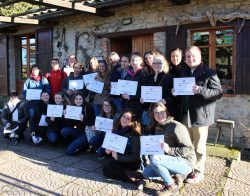

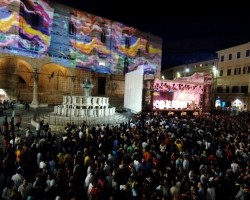 Once winners have been notified, we will give them two weeks to buy plane tickets to Italy; if a winner is unable to do so, their apartment space will go to the next participant on the waiting list, that will be set in chronological order. If you don’t win the apartments for this summer, we would still love to see you in Perugia!
Once winners have been notified, we will give them two weeks to buy plane tickets to Italy; if a winner is unable to do so, their apartment space will go to the next participant on the waiting list, that will be set in chronological order. If you don’t win the apartments for this summer, we would still love to see you in Perugia!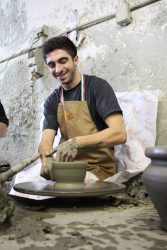 IBST 380 students create their own Deruta ceramics
IBST 380 students create their own Deruta ceramics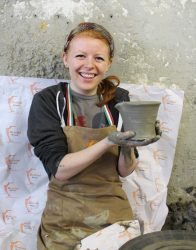 IBST 380 students create their own Deruta ceramics
IBST 380 students create their own Deruta ceramics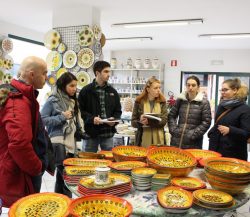

 CESP 351 students hosted a film screening to encourage the local community to become more aware of issues surrounding fair trade
CESP 351 students hosted a film screening to encourage the local community to become more aware of issues surrounding fair trade